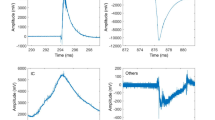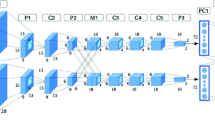Abstract
Aiming at the problem of large measurement error in existing electric field intensity measurement methods, an intelligent measurement method of power frequency induced electric field intensity based on convolution neural network feature recognition is proposed. According to the working principle of power devices in power environment, the mathematical model of power frequency induced electric field is established. The power frequency induction electric field intensity signal is collected by the intelligent chemical frequency induction electric field intensity measuring device. The convolution neural network is used to extract and recognize the characteristics of the power frequency induced electric field intensity signal. Through feature matching, intelligent measurement results of power frequency induced electric field intensity are obtained. The test results show that the average electric field intensity measurement error of the proposed method is reduced by 1.24 N/C, which solves the problem of large measurement error.
Access this chapter
Tax calculation will be finalised at checkout
Purchases are for personal use only
Similar content being viewed by others
References
Goncharenko, I.A., Ryabtsev, V.N.: High-frequency electric field intensity sensor based on double-slot waveguides filled with electro-optical polymer. Quantum Electron. 51(11), 1044–1050 (2021)
Zhong, Y., Deng, W., Liu, W., et al.: Research on measurement technology of electric field strength sensor based on UAV. Electr. Eng. (21), 146–148 (2022)
Chen, B., Wang, H., Yang, S., et al.: An efficient algorithm of three-dimensional explicit electromagnetic sensitivity matrix in marine controlled source electromagnetic measurements. Acta Physica Sinica (6), 356–371 (2021)
Yu, H., Zhao, M., Wu, X., et al.: Influences of crack-face electric boundary conditions on stress intensity factors of ferroelectric single crystals. Appl. Math. Model. 101, 380–405 (2022)
Zhang, G., Wu, P., Sun, J., et al.: Effect of local electric field on radial oscillation of electron beam in low-magnetic-field foilless diode. IEEE Trans. Plasma Sci. PP(99), 1–5 (2020)
Liu, S., Wang, S., Liu, X., Gandomi, A.H., Daneshmand, M., Muhammad, K., De Albuquerque, V.H.C.: Human memory update strategy: a multi-layer template update mechanism for remote visual monitoring.IEEE Trans. Multimedia 23, 2188–2198 (2021)
Liu, S., Wang, S., Liu, X., et al.: Fuzzy detection aided real-time and robust visual tracking under complex environments. IEEE Trans. Fuzzy Syst. 29(1), 90–102 (2021)
Gao, P., Li, J., Liu, S.: An introduction to key technology in artificial intelligence and big data driven e-learning and e-education. Mob. Netw. Appl. (2021)
Lu, B., Gao, S., Song, L., et al.: The study on a new method for measurement of electric fast transient voltage based on electric induction of metal slice. IEEE Trans. Ind. Electron. PP(99), 1 (2020)
Li, H., Li, W., Ma, Q., et al.: Attenuation of plasmaspheric hiss associated with the enhanced magnetospheric electric field. Ann. Geophys. 39(3), 461–470 (2021)
Acknowledgement
Science and Technology Project of China Southern Power Grid Co., Ltd. (GZHKJXM20200058).
Author information
Authors and Affiliations
Corresponding author
Editor information
Editors and Affiliations
Rights and permissions
Copyright information
© 2024 ICST Institute for Computer Sciences, Social Informatics and Telecommunications Engineering
About this paper
Cite this paper
Li, Y., Peng, Z., Yi, M., Liu, J., Yu, S., Liu, J. (2024). Intelligent Measurement of Power Frequency Induced Electric Field Strength Based on Convolutional Neural Network Feature Recognition. In: Wang, B., Hu, Z., Jiang, X., Zhang, YD. (eds) Multimedia Technology and Enhanced Learning. ICMTEL 2023. Lecture Notes of the Institute for Computer Sciences, Social Informatics and Telecommunications Engineering, vol 532. Springer, Cham. https://doi.org/10.1007/978-3-031-50571-3_20
Download citation
DOI: https://doi.org/10.1007/978-3-031-50571-3_20
Published:
Publisher Name: Springer, Cham
Print ISBN: 978-3-031-50570-6
Online ISBN: 978-3-031-50571-3
eBook Packages: Computer ScienceComputer Science (R0)




